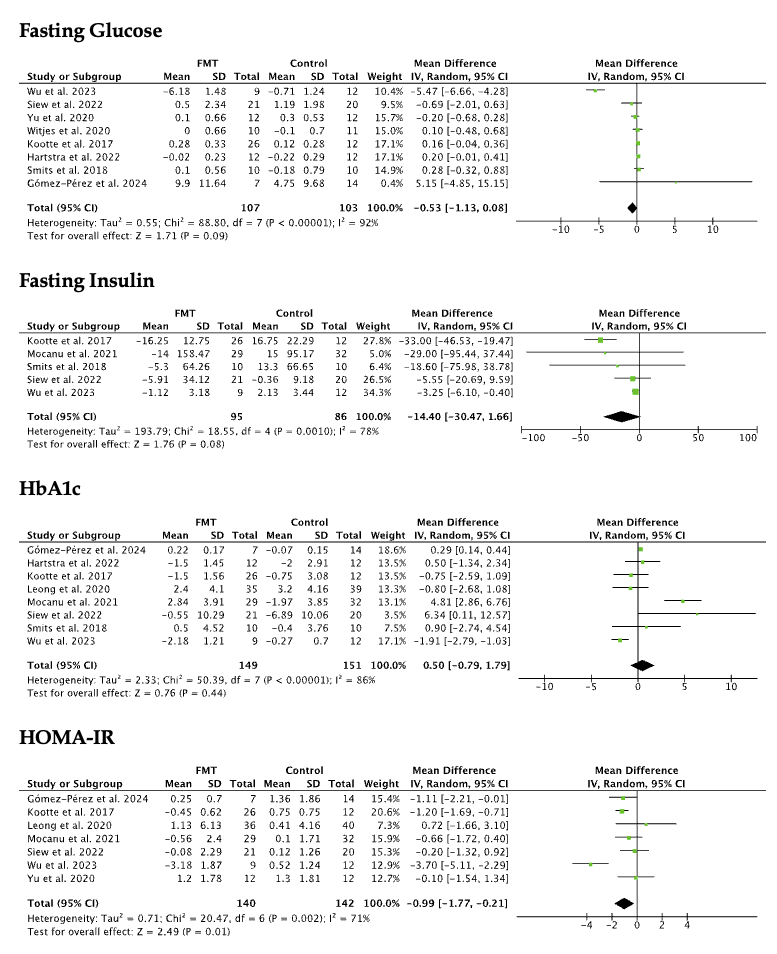Tuesday Poster Session
Category: Infections and Microbiome
P5557 - Impact of Fecal Microbiota Transplantation on Diabetic Profile and Glucose Metabolism Indicators: A Systematic Review and Meta-Analysis
Tuesday, October 28, 2025
10:30 AM - 4:00 PM PDT
Location: Exhibit Hall

Harshaman Kaur, MD (she/her/hers)
Honor Health Mountain Vista Medical Center
Mesa, AZ
Presenting Author(s)
Harshaman Kaur, MD1, Maneeth Mylavarapu, MBBS, MPH2, Angsupat Pornchai, MD3, Sunny Kumar, MD4, Himani Mongia, MBBS5
1Honor Health Mountain Vista Medical Center, Mesa, AZ; 2Walker Baptist Medical Center, Jasper, AL; 3University of Pittsburgh Medical Center, Harrisburg, PA; 4Wright Center for Graduate Medical Education, Scranton, PA; 5The Wright Center for Graduate Medical Education, Scranton, PA
Introduction: The gut microbiome plays a crucial role in metabolic health, and dysbiosis has been implicated in the pathogenesis of type 2 diabetes mellitus (T2DM). Fecal microbiota transplantation (FMT) is an emerging therapeutic strategy that aims to restore gut microbial balance. While promising, its precise effects on diabetes need to be further assessed. This meta-analysis aimed to systematically evaluate the impact of FMT on key glucose metabolism indicators, including fasting glucose, fasting insulin, glycated hemoglobin (HbA1c), and Homeostatic Model Assessment for Insulin Resistance (HOMA-IR).
Methods: A comprehensive search of relevant literature was conducted to identify randomized controlled trials investigating the effect of FMT on glucose metabolism in human subjects. Data on fasting glucose, fasting insulin, HbA1c, and HOMA-IR were extracted and pooled using a random-effects model to account for potential heterogeneity across studies. Mean differences (MD) and 95% confidence intervals (CI) were calculated. Heterogeneity was assessed using the I2 statistic. A p-value < 0.05 was considered statistically significant.
Results: A total of 10 studies encompassing 345 patients (171 FMT; 174 Control) were included in the analysis. The FMT group had a statistically significant reduction in HOMA-IR [MD -0.99; 95% CI -1.77, -0.21; p=0.01; I2=71%] compared to placebo. However, the FMT group was not significantly associated with change in fasting glucose [MD -0.53; 95% CI -1.13, 0.08; p=0.09; I2=92%], fasting insulin [MD -14.40, 95% CI -30.47, 1.66; p=0.08; I2=78%], and HbA1c [MD 0.50; 95% CI -0.79, 1.79; p=0.44; I2=86%]. Figure 1 shows the impact of FMT on glucose metabolism indicators.
Discussion: Our findings suggest that FMT may improve insulin sensitivity, as evidenced by a significant reduction in HOMA-IR. However, no statistically significant effect was observed for fasting glucose, fasting insulin, or HbA1c. The substantial heterogeneity across the outcomes highlights the need for further research to understand the variability in FMT's effects. Future large-scale, well-designed trials with standardized protocols are needed to clarify the precise role of FMT in the management of glucose dysregulation.

Figure: Figure 1: Impact of FMT on Glucose Metabolism Indicators
Disclosures:
Harshaman Kaur indicated no relevant financial relationships.
Maneeth Mylavarapu indicated no relevant financial relationships.
Angsupat Pornchai indicated no relevant financial relationships.
Sunny Kumar indicated no relevant financial relationships.
Himani Mongia indicated no relevant financial relationships.
Harshaman Kaur, MD1, Maneeth Mylavarapu, MBBS, MPH2, Angsupat Pornchai, MD3, Sunny Kumar, MD4, Himani Mongia, MBBS5. P5557 - Impact of Fecal Microbiota Transplantation on Diabetic Profile and Glucose Metabolism Indicators: A Systematic Review and Meta-Analysis, ACG 2025 Annual Scientific Meeting Abstracts. Phoenix, AZ: American College of Gastroenterology.
1Honor Health Mountain Vista Medical Center, Mesa, AZ; 2Walker Baptist Medical Center, Jasper, AL; 3University of Pittsburgh Medical Center, Harrisburg, PA; 4Wright Center for Graduate Medical Education, Scranton, PA; 5The Wright Center for Graduate Medical Education, Scranton, PA
Introduction: The gut microbiome plays a crucial role in metabolic health, and dysbiosis has been implicated in the pathogenesis of type 2 diabetes mellitus (T2DM). Fecal microbiota transplantation (FMT) is an emerging therapeutic strategy that aims to restore gut microbial balance. While promising, its precise effects on diabetes need to be further assessed. This meta-analysis aimed to systematically evaluate the impact of FMT on key glucose metabolism indicators, including fasting glucose, fasting insulin, glycated hemoglobin (HbA1c), and Homeostatic Model Assessment for Insulin Resistance (HOMA-IR).
Methods: A comprehensive search of relevant literature was conducted to identify randomized controlled trials investigating the effect of FMT on glucose metabolism in human subjects. Data on fasting glucose, fasting insulin, HbA1c, and HOMA-IR were extracted and pooled using a random-effects model to account for potential heterogeneity across studies. Mean differences (MD) and 95% confidence intervals (CI) were calculated. Heterogeneity was assessed using the I2 statistic. A p-value < 0.05 was considered statistically significant.
Results: A total of 10 studies encompassing 345 patients (171 FMT; 174 Control) were included in the analysis. The FMT group had a statistically significant reduction in HOMA-IR [MD -0.99; 95% CI -1.77, -0.21; p=0.01; I2=71%] compared to placebo. However, the FMT group was not significantly associated with change in fasting glucose [MD -0.53; 95% CI -1.13, 0.08; p=0.09; I2=92%], fasting insulin [MD -14.40, 95% CI -30.47, 1.66; p=0.08; I2=78%], and HbA1c [MD 0.50; 95% CI -0.79, 1.79; p=0.44; I2=86%]. Figure 1 shows the impact of FMT on glucose metabolism indicators.
Discussion: Our findings suggest that FMT may improve insulin sensitivity, as evidenced by a significant reduction in HOMA-IR. However, no statistically significant effect was observed for fasting glucose, fasting insulin, or HbA1c. The substantial heterogeneity across the outcomes highlights the need for further research to understand the variability in FMT's effects. Future large-scale, well-designed trials with standardized protocols are needed to clarify the precise role of FMT in the management of glucose dysregulation.

Figure: Figure 1: Impact of FMT on Glucose Metabolism Indicators
Disclosures:
Harshaman Kaur indicated no relevant financial relationships.
Maneeth Mylavarapu indicated no relevant financial relationships.
Angsupat Pornchai indicated no relevant financial relationships.
Sunny Kumar indicated no relevant financial relationships.
Himani Mongia indicated no relevant financial relationships.
Harshaman Kaur, MD1, Maneeth Mylavarapu, MBBS, MPH2, Angsupat Pornchai, MD3, Sunny Kumar, MD4, Himani Mongia, MBBS5. P5557 - Impact of Fecal Microbiota Transplantation on Diabetic Profile and Glucose Metabolism Indicators: A Systematic Review and Meta-Analysis, ACG 2025 Annual Scientific Meeting Abstracts. Phoenix, AZ: American College of Gastroenterology.
